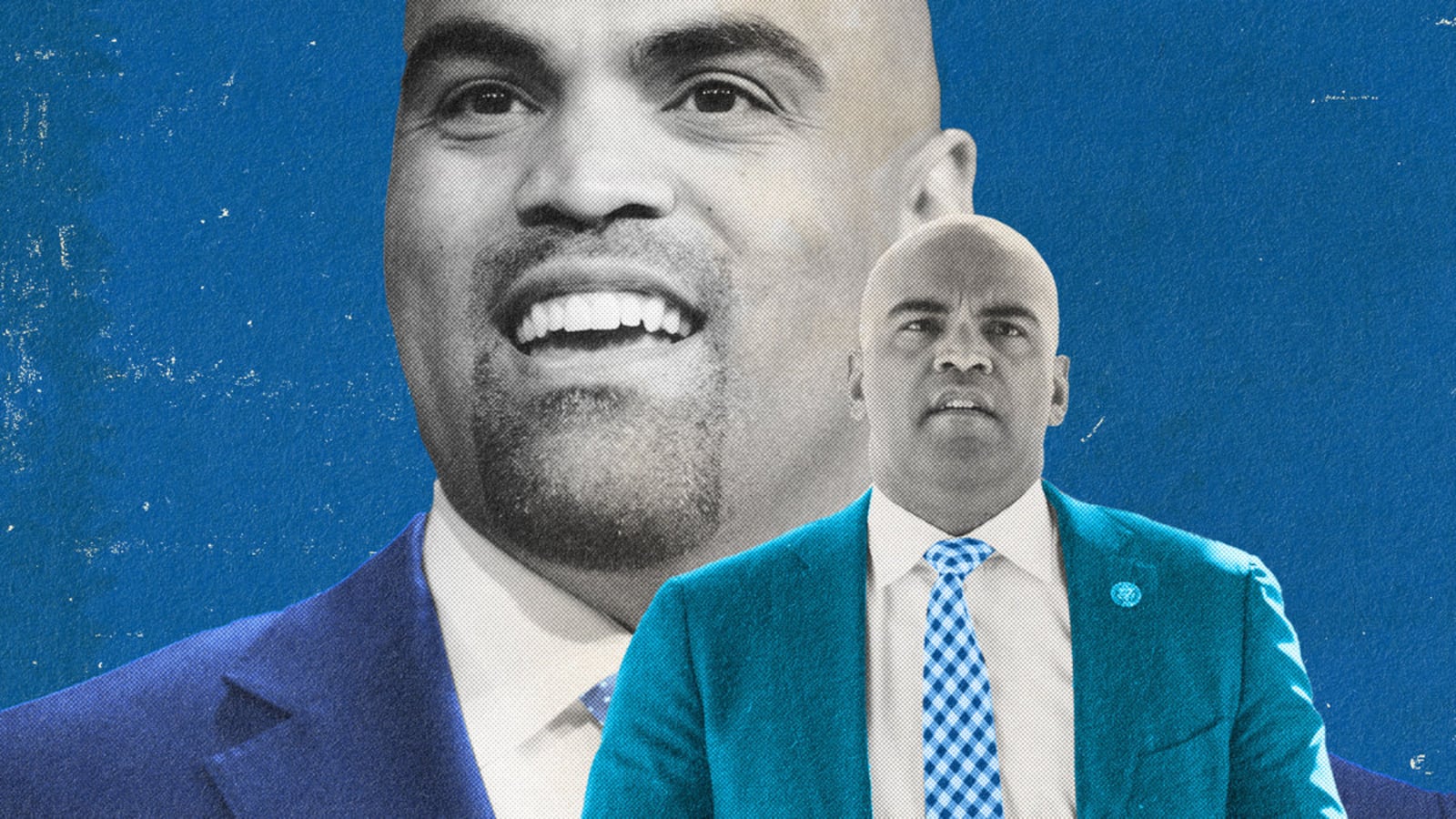Five years ago, Beto O’Rourke’s narrow loss to Sen. Ted Cruz seemed to show that, under the right conditions, deep-red Texas could be flipped blue—and that its famously crusading conservative senator was far more vulnerable than he looked.
Two election cycles later, no candidate has come closer than O’Rourke did to realizing the Democratic dream of a watershed Texas breakthrough. But to hear Cruz’s newest challenger tell it, his task at hand in the 2024 election isn’t to fundamentally reshape Texas.
It’s far simpler: fire Cruz.
The senator’s moves since 2018 have provided more than enough material to make the case, argues Rep. Colin Allred (D-TX), the third-term congressman from Dallas who launched his campaign for Senate last month.
In an interview with The Daily Beast, Allred previewed all the themes his challenge will feature: Cruz’s objection to the 2020 election outcome after a pro-Trump mob stormed the Capitol on Jan. 6, his opposition to legislation to prevent a default on the debt and to fund high-tech manufacturing, his coziness with far-right culture warriors, his zeal for the conservative media spotlight, and, yes, Cancun. A whole lot of Cancun.
The indelible image of Cruz returning to a storm-stricken Texas—where millions of his constituents were cold and without power in February 2021—from a family vacation in the Mexican resort city is, unsurprisingly, the apotheosis of Allred’s case against the incumbent. He calls it the “perfect encapsulation of how Ted Cruz sees himself as a public servant.”
“To be able to go on vacation, during a statewide crisis, says so much about you, because there are so many things a senator could and should be doing during that time,” Allred said. “To have that idea that might be a good time for you to get away says a lot about your seriousness about the job.”
The polarizing Cruz’s reputation—with Texas voters either loving or hating him but few in the middle—has broadly not changed much since the 2018 race. The difference now, Allred said, are moments like Cancun, as well as other factors, like Cruz’s increasing focus on his podcast, “The Verdict With Ted Cruz,” which he puts out three times a week.
“That is something we have seen over these last seven years highlighted even more,” Allred said. “He seems to have changed his vision from wanting to be president to wanting to be in conservative media.”
In response to questions from The Daily Beast, Cruz campaign spokesperson Macarena Martinez said “it’s not surprising that Colin Allred’s sole strategy is to launch a smear campaign to divert attention away from his radical, leftist record in Congress.” (Allred has been a very reliable vote for Democratic leadership, but is not among the most left-leaning members of the caucus.)
“Unlike Allred, Senator Cruz is proud of his long-standing record fighting for the people of Texas,” Martinez continued. “Since day one, Senator Cruz has been leading the charge in Washington promoting Texas jobs, securing our southern border, keeping our cities safe, and exposing the deep state.”

While Allred is explicit about why the Cruz of 2024 is different from the Cruz of 2018, he’s more guarded about the other key dynamic of this race: how he is different from O’Rourke.
“Listen, we’re different folks,” Allred said. “I’m not afraid to do a contrast in terms of what my record is, what I want to do, versus Ted Cruz’s record of what I think would be failing us. I don’t think that's negative at all.”
That comment is a reference to O’Rourke’s reluctance to launch attacks on Cruz until the final weeks of the race. Allred is also quick to mention he has won tough races before—he flipped a traditionally Republican seat in the Dallas suburbs in 2018—while noting, without mentioning O’Rourke, that his battle-tested record is “something we have not really had an experience of” in the past. (O’Rourke represented a safely liberal seat in El Paso.)
Still, Allred has a needle to thread with his candidacy. He needs to capture the excitement that O’Rourke generated, while not generating the GOP backlash. He wants to build a movement, while not raising the alarm for Republicans so they rally to Cruz’s side.
Essentially, he wants to be O’Rourke without the losing part.
To close observers of Texas politics, the differences between the two men are quite clear. “I think O’Rourke leads with his heart and Allred leads with his head,” said Brandon Rottinghaus, a professor of political science at the University of Houston.
Allred, a Black man raised by a single mother who went from playing in the NFL to being a voting rights lawyer, is a polished communicator, said Rottinghaus, someone who “can deliver a really good message, is young and engaging, has a good story, and has bipartisan chops.” O’Rourke, he said, was a “radical, skateboarding quasi-populist” with a rare ability to galvanize a crowd.
“My sense is Allred is a much more careful, more tactical, more disciplined campaigner than O’Rourke is,” Rottinghaus said. “The campaign trail with O’Rourke was a lot more freewheeling and more frenetic than you’ll see for Colin Allred.”
What’s not yet clear is whether the contrasts between the two men will make the difference between the long-awaited victory Democrats have been hoping for—or yet another Texas disappointment. In the 2024 election cycle, in which Democrats are defending their narrow Senate majority in daunting states like West Virginia, Texas actually represents the party’s best chance to flip a Republican-held seat, meaning the race will likely draw national attention.
Allred has already demonstrated national interest in his campaign: he raised $2 million within 36 hours of his announcement. Although they will be tied up protecting seats in seven other states, national Democrats are closely tracking Texas. “Democrats will look for every opportunity to put Republicans on defense, including in states like Texas,” said a national Democrat working on Senate races.
Still, it’s likely Allred will have to do much of the lifting on his own, which seems to suit him just fine.
“I feel the same way as I did in 2018,” Allred said. “Ted Cruz is our problem in Texas, and Texans are going to be the ones who are going to fire him. If other folks want to help out in some ways… we don’t necessarily need it.”
Cruz, meanwhile, appears determined to avoid a repeat of his close call in 2018, when observers believed he didn’t adequately prepare for a real fight.
“Ted Cruz learned some lessons from 2018,” said Matt Wiltshire, a Houston-based GOP operative. “Beto had something like 20 staff for every single one of Ted’s. I don’t think Ted is going to make the same mistake.”
The same assessment is shared by others in Republican circles. “Cruz is taking his 2024 race seriously and has put together a top-notch operation,” a national GOP strategist told The Daily Beast.
Notably, in recent months, Cruz has appeared to find moments to tack away from the hard right, even as he continues dishing up red meat on culture war concerns through his Fox News hits, podcast interviews, and social media. Recently, NBC News reported Cruz was attempting to “burnish” his bipartisan credentials ahead of his reelection—a framing which sparked widespread derision on the left.
Last month, Cruz picked an interesting fight when he vocally denounced a new, draconian anti-LGBT law in Uganda as “horrific,” earning him ire from far-right religious conservatives who have supported him in the past.
To Allred, the conspicuous stand rings hollow, and fits with his broader critique of Cruz. “I’m glad to see that he condemned the brutal and terrible law in Uganda, but he’s not willing to disassociate himself from his former podcast co-host who said transgenderism needed to be eradicated,” he said, referencing the right-wing pundit Michael Knowles. “It doesn’t line up and feels inauthentic.”
The subject of the GOP’s positioning on social issues is poised to be a key element of Allred’s campaign, fitting for his campaign against a figure who pushed the party rightward. But it’s also a useful foil for another concern for the congressman: the challenges of running as a Democrat in a state that has not elected one statewide in decades.
Asked whether he worries about the Democratic brand in Texas, Allred deflected. “I’ve always run as myself, and tried to establish who I am, and I’ve got a different story than most folks,” he said, before quickly adding that Republicans are “the ones who need to be concerned with their image.”
Citing GOP efforts to ban abortion and the Jan. 6 riot, Allred argued, “this is going to be a challenging election for extremists like Ted Cruz—that's what people are really concerned about.”
In the 2022 election, Democrats won races in difficult terrain by emphasizing the argument that “MAGA Republicans”—who were often the GOP’s standard-bearers—were infringing on freedoms, like reproductive rights, that were supported by Democrats, Republicans, and independents.
While Texas is growing more competitive, observers like Rottinghaus say that in order to beat Cruz, Allred will need to pull together a diverse coalition of “moderate suburban voters, Republican women, college-educated younger Republicans, and self-identified independents.”
Luckily for Allred, he has experience doing just that. In 2018, he defeated longtime incumbent Rep. Pete Sessions (R-TX) in a historically Republican suburban district by six points, one of the key data points of the Trump-era partisan political realignment. The people who voted for him that year, Allred said, “are no longer going to be voting for Ted Cruz.”
To underscore his broad appeal, the congressman is quick to note that he has been endorsed by both the U.S. Chamber of Commerce and organized labor, traditionally two redoubts for the center-right and the center-left, respectively. “I’m not a generic Democrat,” Allred said.
However, Rottinghaus noted that Allred won’t be alone in the Democratic primary, and he may have to contend with a challenger more in the Beto mold.
Roland Gutierrez, a state senator who represents the gun violence-scarred community of Uvalde, is reportedly very likely to run against Cruz. Like O’Rourke, he has grabbed headlines for confronting Texas GOP leaders who have refused to pass gun reforms, and could capture enthusiasm among Democratic voters.
The GOP, Rottinghaus argues, will paint Allred as a liberal Democrat no matter what. But some of his recent votes have given fodder to national Republicans, like one in which he joined progressives to oppose legislation classifying fentanyl in the most dangerous category of illegal drugs. That placed him at odds with many fellow Democrats, including some running for Senate in battleground states, like Reps. Elissa Slotkin (D-MI) and Ruben Gallego (D-AZ).
The politics of that vote were so baffling to the GOP that it suggests he’s not serious about the race, argued National Republican Senatorial Committee spokesman Philip Letsou, or that “he may be considering dropping out of the Senate race to run in his safe Democrat congressional seat instead.”
“That would be a good idea if he doesn’t want to end up as irrelevant as Beto O’Rourke,” Letsou quipped.
In response to Cruz and the NRSC’s lines of attack, Allred campaign manager Paige Hutchinson said, “there is one extremist in this race, and that is Ted Cruz. Colin Allred is one of the most bipartisan members of Congress, and he will continue that work as the next Senator for Texas."
At the same time, Allred is leaning into a strategy that has galvanized Democrats’ dreams of winning in Texas: activating people who don’t turn out to vote. This idea was key to O’Rourke’s past runs. As he was fond of saying, “Texas is not a red state nor is it a blue state. It is a non-voting state.”
Perhaps more even than O’Rourke, Allred is going all-in on another bet: that Texas is not a Ted Cruz state.
“Texans know who he is—only looking out for himself, abandons our state when we’re freezing in the dark to go on vacation, votes to default on the U.S. economy, who’s too busy podcasting to get something done,” Allred said.
“That’s why I think he can be beaten,” he said.








